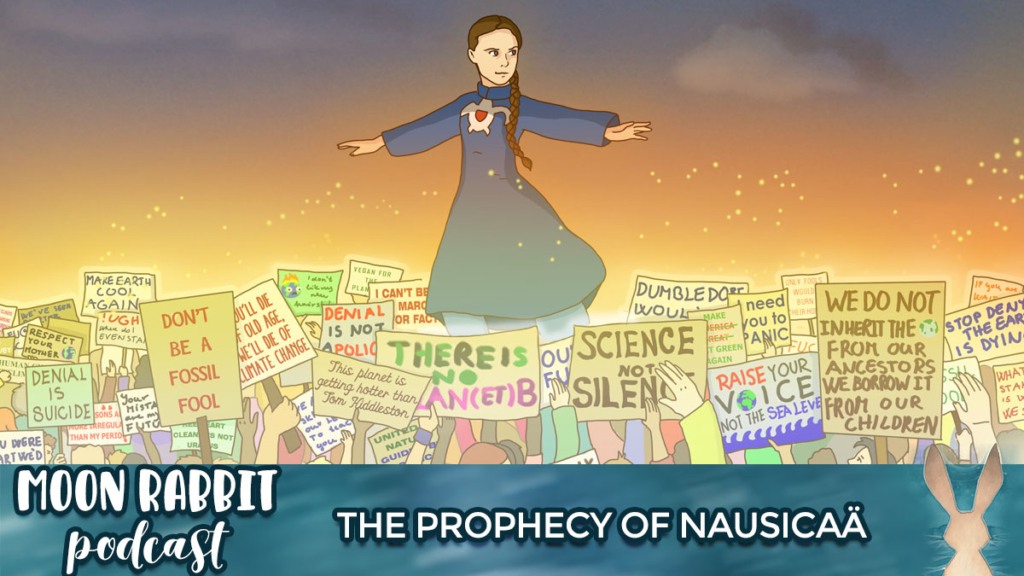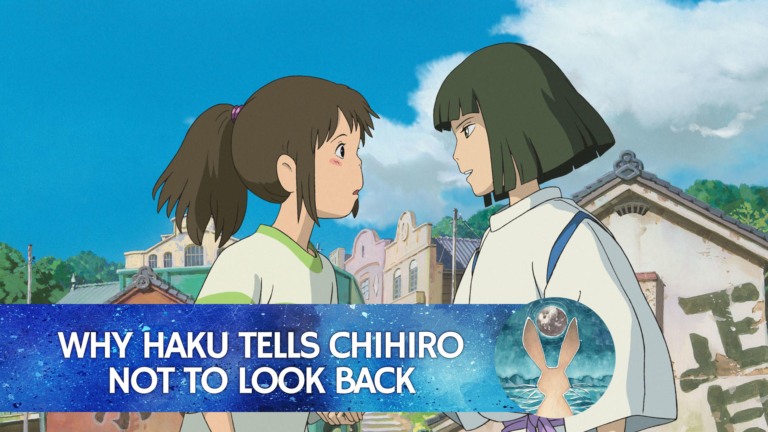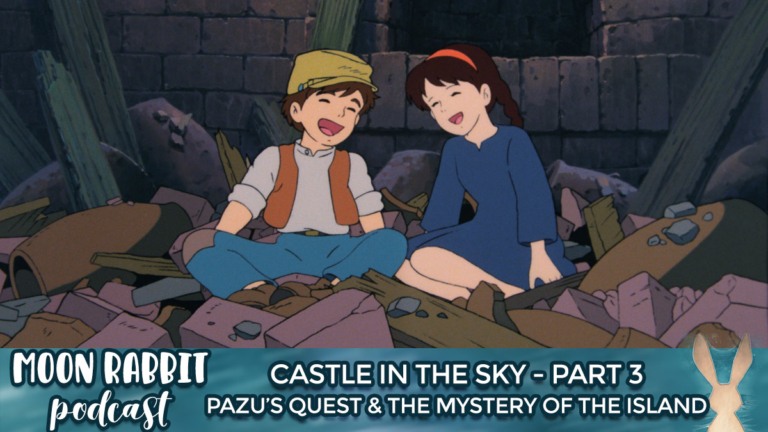
Nausicaa of the Valley of the Wind, an 1984 film based on a 12th century Japanese folktale, is one of Hayao Miyazaki’s most important works that a lot of people in the West haven’t even heard about.
In this episode we sat down with independent cinema expert Flick Beckett (who has just seen the film for the first time) to talk about:
- how this single film led to the creation of Studio Ghibli
- the specific 12th century Japanese folktale that Miyazaki adapted and flipped the interpretation of
- how the story flips the “prophecy” story trope it gets from Frank Herbert’s novel Dune in a way that mainstream Hollywood rarely does even decades later
- how the hero’s adversaries are never really evil in Miyazaki films
- and finally, how the Nausicaa story itself has prophesised the climate movement of today
How to listen to the Moon Rabbit Podcast
- Right here, right now: Click on the big play button above. Magic!
- Take it with you: Download the mp3 for this episode by clicking here!
- On your favourite podcast app: search for “Moon Rabbit” on iTunes, Spotify, Google Podcasts, Podcast Addict, or your preferred podcast app. (And if you can’t find it, let me know which service is missing it!)


Hello there sir. I would like to make a specific, probably nerdy critique of something said in “THE PROPHECY OF NAUSICAÄ” podcast. I disagree with your comment that George Lucas did not do the prophecy story trope well in the Star Wars Prequels. This is of course my opinion, but I think the way the prophecy of the Chosen One is introduced in Episode 1 is interesting, and also how different characters in the prequels think differently about the prophecy and it affecting their actions/mindset. Take Qui-Gon Jinn for example. He believed that Anakin was the chosen one and held that belief right up to his death in Episode 1. Obi-Wan, possibly affected by Qui-Gon’s strong conviction in the prophecy, likewise seems to have believed that the prophecy was true and that Anakin was the chosen one, but then I think, based on some of his dialogue in Episode III (after Obi-Wan wounded Anakin in their duel) gave up that belief. In Episode III Mace Windu seems to have expressed skepticism about the prophecy and Yoda caution about its interpretation. I find this diversity of views interesting and good character/story building. When you do a sort of retro-looking at the original Star Wars trilogy regarding the prophecy of the chosen one mentioned in the prequels, it would seem to me that Luke Skywalker may have been thought by Obi-Wan and Yoda to be the one whom the prophecy was really talking about, given what happened to Anakin. But then, to the surprise of possibly to every character in-universe except maybe Luke, Anakin Skywalker is turned back to the light side by the love of his son and destroys the Emperor and Darth Vader in Episode VI, thereby fulfilling the prophecy mentioned in the prequels. And I am thinking that Anakin did not have the prophecy in mind when he saved Luke from the Emperor (Anakin/Darth Vader may have forgotten about the prophecy or given up on it with all the time he spent as Darth Vader). So, I think the whole prophecy thing in the Star Wars saga ends up being a nice addition to the story as a whole (as a side note, I think in my personal interpretation of the Star Wars storyline I leave out Episodes 7, 8, & 9 and let the Star Wars movie saga end with Return of the Jedi).
Hey David,
You make some great points, and I agree my quick aside to mention Star Wars is kind of a throwaway comment in there as I gave a quick rundown of other stories where the prophecy trope was introduced with the intent to deconstruct those tropes.
To elaborate on that point, in terms of works that deal with this trope in this way, you have Nausicaä, you have the Matrix trilogy, you have the Star Wars prequels, you have Escaflowne to drop in another Japanese work, and you have the book that all of these got the idea to do the trope breakdown from, Dune.
Of all of these mentioned, it is actually the Star Wars prequel trilogy that is closest to the Dune treatment of the trope, directly looking at how a prophecy about the rise of a great leader can go both ways, and how easily you can end up with a tyrant instead of a messiah. (I go into the Dune-Star Wars connections in a bigger Star Wars talk that I’ve yet to edit and release on this blog, but do stay on the mailing list if you’re interested, I’ll get around to it eventually. 🙂 )
And I completely agree that you have a good range of opinions expressed about the prophecy in the prequels, culminating in Obi-Wan’s line “You were the chosen one”, which is his first out-loud realisation of being wrong to blindly follow a tenet handed down to him by his mentor and superiors. In looking back at the prequels, I wish this was a much stronger storyline — the fact that Obi-Wan latched onto the kid as his sole mission after (or because of) suffering huge trauma is never really explored, as screen time is instead refocused on Obi-Wan’s adventures with the clone army/Count Dooku plotline, which is interesting on its own but Obi-Wan’s personal storyline is not woven in. The films could have spent much more time exploring how Obi-Wan and Anakin eventually drift away and become tragic enemies, but there are actually not enough story beats devoted to them in the script to explore how Obi-Wan’s relationship to the prophecy, to a changing Anakin and subsequently to his own path as a Jedi are transformed by the events.
It’s really my unavoidable filter with my background in screenwriting, but this is just one example why I’m not able to watch the Star Wars prequels without wanting to send the script back for at least two rewrites, and also, perhaps paradoxically, urge Lucas to stay on track with his grand story plan and not alter the overall course of second episode based on the negative feedback on elements of the first one. (A tangent for another time.)
Overall I think there are a number of very strong scenes and standout moments in the prequels (the final Anakin/Obi-Wan confrontation among them), but for me personally these films are pulled down by the lack of writing polish due to the missing creative team of Gary Kurtz, Laurence Kasdan and Leigh Brackett and the excellent dialogue rewrites of Carrie Fisher that you had for the original trilogy. Lucas, like the Wachowskis, have their real strength in concept, worldbuilding and knowing what themes and tropes need to be in a story. On the flipside, they have a lot of trouble with distilling the dialogue, so projects where they are part of a bigger team of writers tend to produce their strongest work, and when they are sole creators on projects, the projects tend to suffer for it.
Long story short, this is why I personally feel that the prophecy trope is not covered as well in the prequels as some of the other things that set out to deconstruct it, and that’s because I feel that it could have been explored much better than it has. At the end of the day, though, it remains personal preference. 🙂
And if you’re interested in more of this prophecy deconstruction trope, I urge you to read the first Dune book if you haven’t already (or the first three if you get hooked), if for nothing else to see where Lucas got the idea for it. 🙂